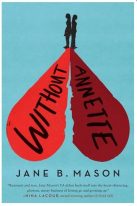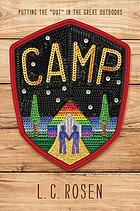 Mason, Jane B. Without Annette. Scholastic Press, 2016. $18.99. ISBN 978-0-545819954.
Mason, Jane B. Without Annette. Scholastic Press, 2016. $18.99. ISBN 978-0-545819954.
This YA novel gripped me from its opening page, so I anticipated a great reading experience. While that ultimately didn’t happen for me, author Mason still gives us much to appreciate.
Fifteen-year-olds Josie and her girlfriend Annette, a couple since age 12, leave small-town Minnesota (and Annette’s abusive mother) to become students at an academically-rigorous co-ed boarding school in Connecticut. When their hopes to room together are dashed, they find themselves plunged into various social dormitory circles, full of snobby “Soleets” [“social elites”]. Josie and Annette resolve not to reveal their true relationship right away and only fleetingly find private time together, but to Josie’s dismay, Annette’s new friends soon draw her into questionable activity, as her entire personality seems to morph negatively under their influence.
The first third of this novel, focusing on boarding school dynamics, is excellent; Davis does a superb job in creating and maintaining her setting’s cloistered ambience and the roiling social pressures lurking within. However, when the plot’s spotlight gradually shifts to Josie apart from Annette, so begin my “issues”.
When her face time with Annette diminishes, Josie begins hanging out with a clique of male students, led by a charming guy who eventually falls in love with her. They play poker together and explore the campus’s underground tunnels, which Davis describes in close-to-boring detail. Another subplot concerning an anthropology class taught by an aging, quirky professor also becomes part of the “Josie-minus-Annette” portion of the book, and I frankly struggled to understand its significance. On the whole, once the “nasty girls” theme seemed to fade into the background, the book’s last half was far less compelling for me.
Annette eventually gets into serious trouble, as her and Josie’s “coupledom” unravels. Eventually, Josie forges a new bond with her artsy straight roommate. But then there’s even more “tunnel time” and additional anthro class discussions, and the novel’s undeniable early spark peters out, in my opinion. The subplots are clumsily tied together only at the very end, leaving me disappointed, especially considering the book’s slam-bang beginnings.
All this said, I do applaud the author’s character development, as her portrayals are commendably meaty. And I repeat that her depiction of the boarding school milieu is first-rate. Many individual elements of this novel are indeed well done, but I believe they could just have been fused together more effectively.
But even with these caveats, I generally recommend this title for LGBT young adult collections. As this is Mason’s first YA novel after a children’s-lit-focused writing career, I do look forward to more “teenage” works from her pen.
Cathy Ritchie
Acquisitions/Selection Services
Dallas (TX) Public Library




